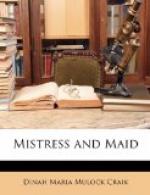Two courses suggested themselves to Hilary—one, to go and consult Miss Balquidder; the other—which came into her mind from some similar case she had heard of—to set on foot inquiries at all police stations. But the first idea was soon rejected: only at the last extremity could she make patent the family misery—the family disgrace. To the second, similar and even stronger reasons applied. There was something about the cool, matter-of-fact, business-like act of setting a detective officer to hunt out their nephew, from which these poor women recoiled. Besides, impressed as he was—he had told his Aunt Johanna so—with the relentlessness of Mr. Ascott, might not the chance of his discovering that he was hunted drive him to desperation?
Hardly to suicide. Hilary steadfastly disbelieved in that. When Selina painted horrible pictures of his throwing himself off Waterloo Bridge: or being found hanging to a tree in one of the parks; or locking himself in a hotel bed chamber and blowing out his brains, her younger sister only laughed—laughed as much as she could—if only to keep Johanna quiet.
Yet she herself had few fears. For she knew that Ascott was, in a sense, too cowardly to kill himself. He so disliked physical pain, physical unpleasantness of all kinds. She felt sure he would stop short, even with the razor or the pistol in his hand, rather than do a thing so very disagreeable.
Nevertheless, in spite of herself, while she and her sisters sat together, hour after hour, in a stillness almost like that when there is a death in the house, these morbid terrors took a double size. Hilary ceased to treat them as ridiculous impossibilities, but began to argue them out rationally. The mere act of doing so made her recoil; for it seemed an acknowledgment that she was fighting not with chimeras but realities.
“It is twenty-four hours since he went,” she reasoned. “If he had done anything desperate he would have done it at once, and we should have heard of it long before now; ill news always travels fast. Besides, his name was marked on all his clothes in full. I did it myself. And his coat pockets were always stuffed with letters; he used to cram them in as soon as he got them, you know.”
And at this small remembrance of one of his “ways,” even though it was an unkind way, and had caused them many a pain, from the want of confidence it showed, his poor, fond aunts turned aside to hide their starting tears. The very phrase “he used to,” seemed such an unconscious admission that his life with them was over and done; that he never would either please them or vex them any more.
Yet they took care that during the whole day every thing should be done as if he were expected minute by minute; that Elizabeth should lay the fourth knife and fork at dinner, the fourth cup and saucer at tea. Elizabeth, who throughout had faithfully kept her pledge; who went about silently and unobservantly, and by every means in her power put aside the curiosity of Mrs. Jones as to what could be the reason that her lodgers had sat up all night, and what on earth had become of young Mr. Leaf.




